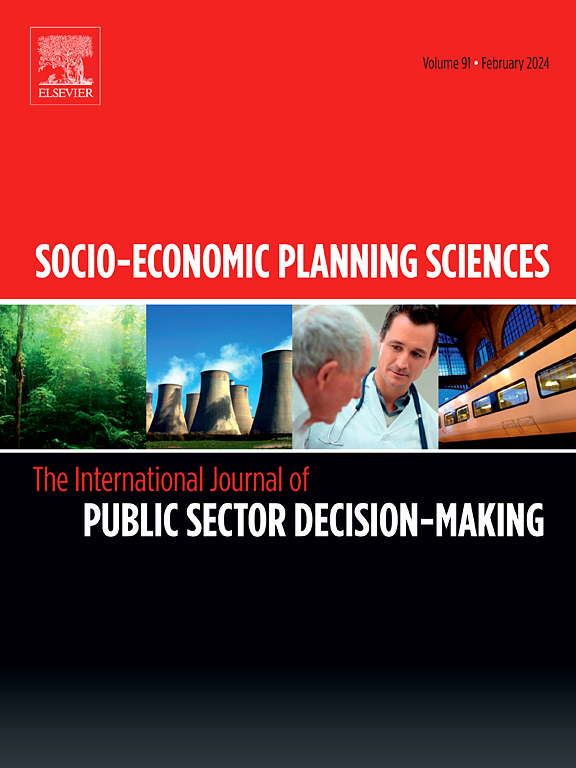Investigating water sustainability towards indicators: An empirical illustration using country-level data
IF 6.2
2区 经济学
Q1 ECONOMICS
引用次数: 0
Abstract
This paper contributes to the academic debate on the construction of synthetic indices with respect to water-based sustainability analysis. In this regard, the United Nations Sustainable Development Goal (SDG) 6.4 specifically considers the progress on water-use efficiency within the target of ensuring access to water and sanitation (SDG 6). Our contribution investigates the levels of water sustainability reached by countries around the world considering a suitable measure of the goal obtained by aggregating variables available at the national level, i.e. water efficiency (SDG 6.4.1) and stress (SDG 6.4.2).
The construction of a composite index for SDG 6.4 is discussed through the usual steps of normalization, aggregation, and weighting, also highlighting the pros, cons and issues encountered in each step. Fundamental issues faced in the construction of synthetic indices are also discussed: different methods for performing the above steps are compared, and uncertainty analysis is carried out to understand which methods could be reasonably suitable to measure the synthetic indicator of the entire target. As a further theoretical contribution, we illustrate some arguments in favor of the application of categorical scales for normalization, even if the results of some countries seem to be particularly sensitive to the choice of weights in the aggregation phase.
Results, obtained after examining univariate and multivariate descriptive statistics, show that the best performances can be observed in small and medium European countries and sub-Saharan African nations (such as Congo, Gabon, and Angola), while the lowest levels appear to be located in Central Asia, the Middle East, and North Africa.
A natural implication of this research is its contribution to valorizing the social capital of a regional area, stimulating new approaches to environmental issues, informing public debate, and influencing policy-making.
调查水资源可持续性指标:使用国家级数据进行实证说明
本文为有关构建以水为基础的可持续性分析合成指数的学术讨论做出了贡献。在这方面,联合国可持续发展目标(SDG)6.4 特别考虑了在确保获得水和卫生设施(SDG 6)的目标范围内提高用水效率的进展情况。我们的贡献调查了世界各国所达到的水资源可持续性水平,考虑了通过汇总国家层面可用的变量(即用水效率(可持续发展目标 6.4.1)和用水压力(可持续发展目标 6.4.2))获得的目标的适当衡量标准。我们通过归一化、汇总和加权等常规步骤讨论了可持续发展目标 6.4 综合指数的构建,还强调了每个步骤中遇到的利弊和问题。我们还讨论了构建合成指数所面临的基本问题:比较了执行上述步骤的不同方法,并进行了不确定性分析,以了解哪些方法可合理地适用于衡量整个目标的合成指标。作为进一步的理论贡献,我们说明了支持采用分类标度进行归一化的一些论点,即使某些国家的结果似乎对汇总阶段的权重选择特别敏感。在对单变量和多变量描述性统计进行研究后得出的结果表明,欧洲中小国家和撒哈拉以南非洲国家(如刚果、加蓬和安哥拉)的表现最好,而中亚、中东和北非的表现似乎最低。
本文章由计算机程序翻译,如有差异,请以英文原文为准。
求助全文
约1分钟内获得全文
求助全文
来源期刊

Socio-economic Planning Sciences
OPERATIONS RESEARCH & MANAGEMENT SCIENCE-
CiteScore
9.40
自引率
13.10%
发文量
294
审稿时长
58 days
期刊介绍:
Studies directed toward the more effective utilization of existing resources, e.g. mathematical programming models of health care delivery systems with relevance to more effective program design; systems analysis of fire outbreaks and its relevance to the location of fire stations; statistical analysis of the efficiency of a developing country economy or industry.
Studies relating to the interaction of various segments of society and technology, e.g. the effects of government health policies on the utilization and design of hospital facilities; the relationship between housing density and the demands on public transportation or other service facilities: patterns and implications of urban development and air or water pollution.
Studies devoted to the anticipations of and response to future needs for social, health and other human services, e.g. the relationship between industrial growth and the development of educational resources in affected areas; investigation of future demands for material and child health resources in a developing country; design of effective recycling in an urban setting.
 求助内容:
求助内容: 应助结果提醒方式:
应助结果提醒方式:


